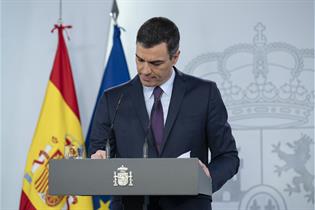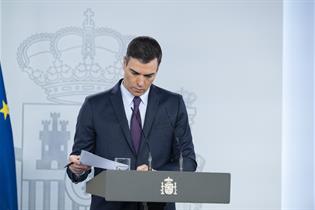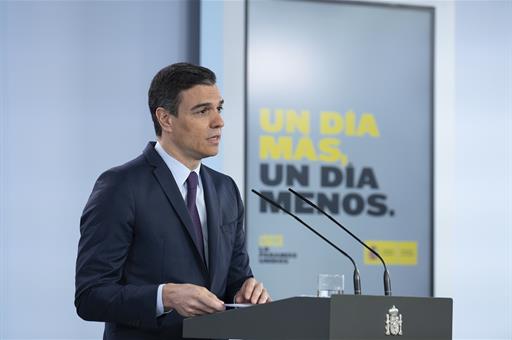Coronavirus COVID-19
Government applies to extend state of emergency a further month to conclude de-escalation process
President's News - 2020.5.16
Moncloa Palace, Madrid
In his weekly appearance by video-conference from Moncloa Palace, the President of the Government stated that, after two "extremely tough" months, Spain has started to move on to a "different scenario" with the re-opening of many stores and resumption in hospitals of care for those ill with other pathologies. While at the start of this period, the spread of the disease grew by around 35% daily, this increase now stands at 0.24%, remarked Pedro Sánchez.
This progress, added the President of the Government, is down to the "enormous sacrifice made by Spanish society as a whole", which has complied with the lockdown with social discipline and common desire for victory.
The President of the Government stressed that some rights have been restricted, "not on a whim", but to contain the epidemic. "We needed to limit social contact to prevent those infected, many of them not showing symptoms, from infecting healthy people. And we also needed to limit the right to free movement and assembly to prevent those infected - highly concentrated, as we have seen, in some parts of the country - from spreading the virus to other areas less affected".
This uneven distribution is precisely one of the results of the first phase of the Seroprevalence Study being coordinated by the Ministry of Health, indicated Pedro Sánchez: there are some provinces where the percentage of people who have been in contact with the virus is 10 times higher than in others, even in some outermost areas.
State of emergency has benefitted all regions
 Pool Moncloa / Borja Puig de la BellacasaThe President of the Government underlined two other conclusions from this research: on average only 5% of Spaniards have been infected, with or without symptoms; and the real fatality rate of COVID-19 stands at around 1% - which rises the older the victim is and for those with underlying conditions.
Pool Moncloa / Borja Puig de la BellacasaThe President of the Government underlined two other conclusions from this research: on average only 5% of Spaniards have been infected, with or without symptoms; and the real fatality rate of COVID-19 stands at around 1% - which rises the older the victim is and for those with underlying conditions.
According to the President of the Government, these figures teach us "two essential lessons": on the one hand, that the state of emergency has worked around the country and has benefitted both those areas with more infections and elsewhere. On the other hand, they show that the only path possible is the one we have followed since the start of the epidemic, based on prudence and safety, both collective and individual. If we had allowed the virus to move freely, claimed Pedro Sánchez, the infection could have affected more than 30 million Spaniards and cost the lives of around 300,000 people, "possibly even higher because our health system would have collapsed".
The President of the Government advocated maintaining caution and recovering "areas of mobility, freedom and economic and social activity, while always ensuring we keep the virus at bay".
Public health rules
Pedro Sánchez added that a de-escalation in phases and in zones proposed by the government and jointly approved with the regional governments, responds to this logic. The President of the Government explained that the transition towards normality may end in half the country at the start of the summer, and in the rest one or two weeks later, provided there is no "second wave" during the process.
The threat from the virus "remains real", according to Pedro Sánchez, who underlined the importance of all citizens "strictly" complying with the indications from the health authorities on hand hygiene, the use of face masks and the personal safety distance. "These are rules that have nothing to do with ideology or business; they are public health rules", he declared.
 Pool Moncloa / Borja Puig de la BellacasaFor all these reasons, argued the President of the Government, the government will ask the Lower House of Parliament to approve a new extension to the state of emergency to manage the health crisis, on this occasion for a period of one month (the current extension ends at midnight on 24 May).
Pool Moncloa / Borja Puig de la BellacasaFor all these reasons, argued the President of the Government, the government will ask the Lower House of Parliament to approve a new extension to the state of emergency to manage the health crisis, on this occasion for a period of one month (the current extension ends at midnight on 24 May).
"This is intended to be the last extension to the state of emergency and to last until the end of the de-escalation", he stressed. The government's aim is to achieve a "broad consensus" in the Lower House, which already exists among the Spanish people, "a consensus that will be backed by all responsible parties that want to be useful to our country, to continue saving lives and fight the pandemic with the tools provided by our Constitution and our laws", stated Pedro Sánchez.
Institutional de-escalation and co-governance
The President of the Government reiterated that the de-escalation will also be institutional: the only government delegate authority in this stage will be the Ministry of Health, which will take on the exceptional powers granted to the Ministers for Defence, for Home Affairs, and for Transport, Mobility and Urban Agenda.
The Ministry of Health, remarked Pedro Sánchez, will set the pace and the forms of the transition process, always based on the advice of departmental technicians and in "close collaboration" and "co-governance" with the regional authorities. The regional governments, which have maintained their capacity to manage their healthcare powers at all times, will slowly recover their full capacity for decision-making, said Pedro Sánchez, who praised the "extraordinary work" they are doing.
The President of the Government pointed out that during the de-escalation, some rights will remain partially limited, in order to save lives and protect public health, and recalled that all remaining personal liberties and systems for the democratic control of the government's action remain intact.
Overcome health emergency to ensure economic recovery
 Pool Moncloa / Borja Puig de la BellacasaPedro Sánchez argued that at the same time as the health dimension of the COVID-19 crisis is tackled, we must attend to the economic and social consequences, highlighting "two significant steps" taken on this front this week: the agreement with the social stakeholders to extend the temporary lay-off plans (Spanish acronym: ERTEs) until 30 June and the start of the work of the Parliamentary Committee for Economic and Social Reconstruction. As we have seen, "unity saves lives, and it can also save companies and jobs", he argued.
Pool Moncloa / Borja Puig de la BellacasaPedro Sánchez argued that at the same time as the health dimension of the COVID-19 crisis is tackled, we must attend to the economic and social consequences, highlighting "two significant steps" taken on this front this week: the agreement with the social stakeholders to extend the temporary lay-off plans (Spanish acronym: ERTEs) until 30 June and the start of the work of the Parliamentary Committee for Economic and Social Reconstruction. As we have seen, "unity saves lives, and it can also save companies and jobs", he argued.
The President of the Government rejected any clash between the health priorities and the economic and labour priorities, since "the only way towards economic recovery and reactivation of the labour market means overcoming this whole health emergency once and for all". Such vital activities for the Spanish economy as tourism, leisure, culture, trade and restaurants", he said, "require safety and health guarantees to be fully re-launched. Each step we take must be a safe step because if we do not do this, but opt to prioritise business over health, we will end up losing on the health front, and also on the business front".
Pedro Sánchez called to overcome the crisis "together; without leaving anyone behind" and with the permanent memory of the victims, who will receive a great public tribute.
"The history of Spain over the last half century is the history of the triumph of comprehension over the ruin of confrontation and division. Many of those who have left us in recent weeks knew that first-hand and better than anyone, due to their age. We trust, as they did, in our capacity as a society. Let's be worthy of their memory", declared the President of the Government.
Non official translation





